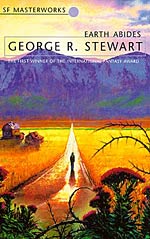
![]() DrPerschon
DrPerschon
3/8/2014
![]()
According to Wikipedia, Apocalyptic Literature refers to that strain of religious revelation in Jewish and Christian scriptures; etymologically, the word apocalypse means "to reveal," and not all apocalyptic literature is necessarily about the destruction of the world. This likely comes as a surprising revelation for the reader of apocalyptic fiction, which is a modern sub-genre of science fiction which does imagine the end of the world. The science fiction classic Earth Abides by George R Stewart is both a seminal work of apocalyptic fiction which relies heavily on biblical imagery and allusion to give the text a sense of that ancient apocalyptic literature.
As SF sub-genres go, I love a good apocalypse, and the first part of Earth Abides, titled "World Without End," was no exception. That sub-title is indicative of the sort of apocalypse Stewart imagined, one where humans were nearly wiped out, but the rest of the world continued. The events are related by Ish, who initially seems to be the only survivor of a devastating pandemic. Having been in the country doing research when the pandemic struck, he is unaware of the death of the human race. Stewart artfully reveals the extent of the devastation through Ish's journey in from the country to San Francisco, so that both Ish and reader learn how bad things are together. The destruction felt conventional, arguably because of the temporal distance between myself and this seminal work, published in 1949. Numerous apocalyptic scenarios have been inspired by Earth Abides, most famously Stephen King's The Stand, a book I read as religiously as St. John's Apocalypse in my youth.
The move from apocalypse to post-apocalypse was less compelling for me. I guess I like to watch the world burn, not get rebuilt. Once Ish and his little enclave of survivors begin to live life after people (one has to wonder about the intertextual conversation of the History Channel series Life After People and works like Earth Abides - both are speculative works, after all), I found the narrative less compelling. The last two sections of the book are nevertheless artful post-apocalyptic conjectures, albeit ones which illustrate post-WWII American sentiments and biases.
These sentiments and biases were among the most engaging parts of the text for me. After all, there is an interesting meta-fictional intersection in the idea that "Language changes, but the text remains the same." I first learned of this concept from Dr. Michael Drout of Wheaton College, but agree entirely in the idea of the text as an artifact, a frozen moment in time. I can imagine Earth Abides as a time capsule from an alternative earth, where there really was a pandemic that nearly wiped out the entire human race. And in reading it, the text freezes Stewart's post-WWII American perspective, complete with its now-anachronistic views of madness, STDs, essential gender differences, and morality.
Of all these views, the one I found most surprising was the lack of religious sentiment in a book that relies so heavily upon biblical allusion. From the title of the book, which quotes Ecclesiastes 1:4 to the italicized sections of text which echo Biblical language, but seemed to me to be the voice of the Earth, the book has a decidedly biblical feel to it. But that biblical feel is one without the God of Abraham and the Church. Ish and the survivor do not reinstate the dominant religion of America, despite the ubiquity of churches in the US in the post-war era. Instead, Stewart seems to be playing with ideas of Earth Goddess in the character of Em, Ish's African-American wife. He refers to her as "Mother of Nations" (276), and renders her one of the most noble and admirable characters. While Ish is a limited first-person narrator, the italicized sections are clearly the voice of an omniscient third-person narrator, which I assume is the voice of the Earth herself. I assume a feminine voice, due to the potential connections I see between that voice and the character of Em. This is not a literal connection mind you, but a thematic one. Speculative scholars doing work on Ethnicity and Gender should find much to say about Em and the voice of the Earth.
But even if we accept the italicized soliloquy-like passages as the voice of the Earth, Earth Abides is still a decidedly secular apocalypse, a movement in literature going back to Mary Shelley's Last Man. What we see here is not the end of the world with the coming of a New Jerusalem, but the end of mankind. Stewart's Earth Abides does the same thing for post-war America that H.G. Wells' War of the Worlds did for Britain. It challenged the idea of a Manifest Destiny or the imago dei by imagining a scenario wherein we are brought to the brink of destruction, and then saving a remnant, not by God's hand, but by the caprice of biology and natural selection. This is an area I'll continue to explore in my reading, as I think SF offers us godless apocalypses regularly--it is due to works like Earth Abides that we no longer think of the word apocalypse as a revelation, but as devastation. While it didn't grip me all the way through, I'm in full agreement with Mike Resnick, who said of Earth Abides: "A beautiful book, one that should never be allowed to go out of print."
http://www.steampunkscholar.com